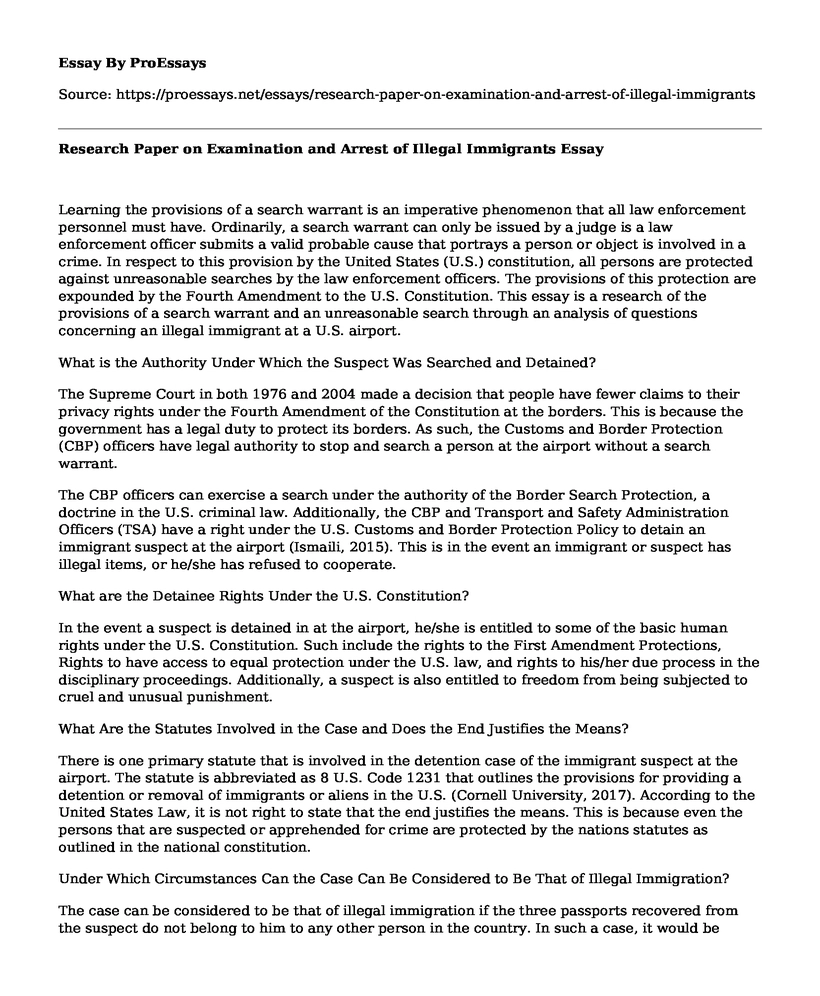Learning the provisions of a search warrant is an imperative phenomenon that all law enforcement personnel must have. Ordinarily, a search warrant can only be issued by a judge is a law enforcement officer submits a valid probable cause that portrays a person or object is involved in a crime. In respect to this provision by the United States (U.S.) constitution, all persons are protected against unreasonable searches by the law enforcement officers. The provisions of this protection are expounded by the Fourth Amendment to the U.S. Constitution. This essay is a research of the provisions of a search warrant and an unreasonable search through an analysis of questions concerning an illegal immigrant at a U.S. airport.
What is the Authority Under Which the Suspect Was Searched and Detained?
The Supreme Court in both 1976 and 2004 made a decision that people have fewer claims to their privacy rights under the Fourth Amendment of the Constitution at the borders. This is because the government has a legal duty to protect its borders. As such, the Customs and Border Protection (CBP) officers have legal authority to stop and search a person at the airport without a search warrant.
The CBP officers can exercise a search under the authority of the Border Search Protection, a doctrine in the U.S. criminal law. Additionally, the CBP and Transport and Safety Administration Officers (TSA) have a right under the U.S. Customs and Border Protection Policy to detain an immigrant suspect at the airport (Ismaili, 2015). This is in the event an immigrant or suspect has illegal items, or he/she has refused to cooperate.
What are the Detainee Rights Under the U.S. Constitution?
In the event a suspect is detained in at the airport, he/she is entitled to some of the basic human rights under the U.S. Constitution. Such include the rights to the First Amendment Protections, Rights to have access to equal protection under the U.S. law, and rights to his/her due process in the disciplinary proceedings. Additionally, a suspect is also entitled to freedom from being subjected to cruel and unusual punishment.
What Are the Statutes Involved in the Case and Does the End Justifies the Means?
There is one primary statute that is involved in the detention case of the immigrant suspect at the airport. The statute is abbreviated as 8 U.S. Code 1231 that outlines the provisions for providing a detention or removal of immigrants or aliens in the U.S. (Cornell University, 2017). According to the United States Law, it is not right to state that the end justifies the means. This is because even the persons that are suspected or apprehended for crime are protected by the nations statutes as outlined in the national constitution.
Under Which Circumstances Can the Case Can Be Considered to Be That of Illegal Immigration?
The case can be considered to be that of illegal immigration if the three passports recovered from the suspect do not belong to him to any other person in the country. In such a case, it would be essential to conduct a further investigation on the suspect to determine the originality of the passports. Additionally, the suspects case can be classified to be that of illegal immigration if the suspects personal records portray that he is from a different nation.
Would the Situation Be Different If the Suspect Was Not Found with the Passport?
If the suspect were not found with the passport, his case would have been different. This is because the CBP or TSA may not have any other reason to detain the suspect at the airport. Moreover, a prolonged, unnecessary detention of the suspect at the airport would infringe on his human rights. Consequently, the suspect could sue the officers who detained him for an unnecessary period.
Conclusion
In conclusion, the airport's authorities have legal right to perform a search on any person at the airport without the need of having a warrant. Also, they cannot be sued by the searched or detained suspects on the basis of the 4th Amendment provisions. This is because the airport authority is charged with the legal function of protecting the nations borders and as a result, they are protected by the nations customs and border search protection legislation.
References
Cornell University. (2017). 8 U.S. Code 1231 - Detention and removal of aliens ordered removed. Retrieved from Cornell University Law School: Legal Information Institute: https://www.law.cornell.edu/uscode/text/8/1231
Ismaili, K. (2015). U.S. Criminal Justice Policy. Burlington: Jones & Bartlett Publishers.
Cite this page
Research Paper on Examination and Arrest of Illegal Immigrants. (2021, Jun 15). Retrieved from https://proessays.net/essays/research-paper-on-examination-and-arrest-of-illegal-immigrants
If you are the original author of this essay and no longer wish to have it published on the ProEssays website, please click below to request its removal:
- Gun Control Debate Essay
- Paper Example on The Chicano Movement: A Success
- Drug Abuse and the Problem of Criminalization Essay
- Intellectual Property: Case Study
- Essay Sample on Cyber Terrorism
- Free Report Sample on Criminal Intelligence Agency: Leveraging Math Models to Improve Decision-Making
- Paper Example on Crime and Justice in Film: A Decade of Reflection







